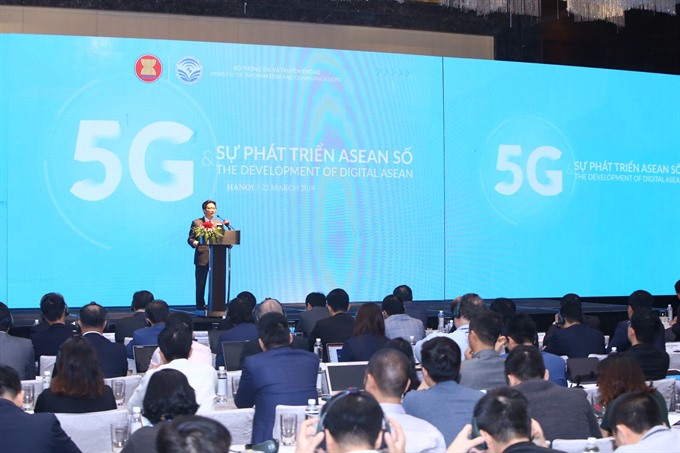ASEAN countries need to strengthen co-operation and share their experiences to ensure they can lead the way on next-generation 5G wireless technology.

ASEAN countries need to strengthen co-operation and share their experiences to ensure they can lead the way on next-generation 5G wireless technology.
So said Deputy Prime Minister Vu Duc Dam at the conference on 5G & Development of Digital ASEAN in Ha Noi on Friday.
According to the Deputy PM, facing the changes and advancement of technology, the ones who are proactive and pioneering will be the more successful afterwards, Dam said.
“When the world implemented 2G, 3G and 4G, ASEAN countries were almost exclusively beneficiaries of the technology,” Dam said. “At that time, the world’s biggest telecommunications companies brought equipment and solutions to the region to sell, and we bought them. With technological changes, some countries in the region have focused more on hardware and software research. This time around, we need to co-operate, share and exchange our intellectual and technological advancements.”
Deputy PM said the initial steps towards developing a new technology are always challenging. Therefore, governments should take the initiative in supporting enterprises to minimise risk.
He stressed the need to boost innovation and address shortcomings related to information security and safety.
Dam also suggested delegates try to develop a suitable roadmap for the development of 5G, including identifying opportunities and challenges and putting forward solutions.
Network development
Speaking at the conference, Minister of Information and Communication Nguyen Manh Hung highlighted the significant role of 5G network development.
The digital economy, with its new business models and methods, is creating opportunities for organisations and enterprises. New technologies will enable better connectivity across supply chains, reducing logistics and business costs.
“5G will be the most important part of the digital economy infrastructure thanks to its greater bandwidth, higher speeds and lower latency,” Hung said.
According to the minister, Viet Nam will be one of the first countries in the world to roll out 5G and is willing to co-operate with other ASEAN countries to establish joint ventures and factories to make the necessary IT equipment.
He said that from the beginning of 2019, the Ministry of Information and Communication (MIC) had already licensed local carriers to test the technology in Ha Noi and HCM City, noting that the country is also focusing on developing other 5G-based technologies and equipment.
Hung stated ASEAN members must focus on building digital infrastructure and working together closely to shorten the development gap with advanced countries.
The minister suggested each ASEAN country implement an initiative and share the results with other countries, improving the efficiency of resource use and promoting the common strength of the region.
With regards to the 5G development situation around the world, Cristian Gomez, director of spectrum policy and regulatory affairs for the Asia-Pacific region at industry group GSMA said the application of the technology is progressing rapidly. Countries are looking for efficient ways to improve mobile connectivity and provide the best quality for customers. 5G is being applied quickly in the US, Europe and some Asia-Pacific countries such as Japan, the Republic of Korea and China.
“The Southeast Asia region with its fast-growing economies will benefit a lot from 5G technology in some areas such as robots, the manufacturing industry and self-driving cars,” Gomez said.
He said that in a smart city, 5G-connected cars can avoid traffic jams and reduce energy consumption.
The event was held by the MIC, the Vietnam Internet Association and the International Data Group. — VNS





